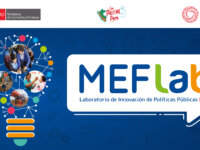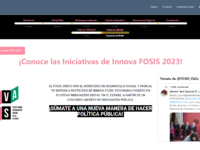The project proposes a system for extracting and analysing information from the medical records of breast cancer patients, using artificial intelligence. This would support research, personalised medicine and health decision-making, benefiting clinicians and regional authorities. This provides an automated alternative to accelerate translational research, promote personalised medicine and improve the efficiency of health services.
Innovation Tag: Innovation Labs and Units
In Peru, the lack of systematic evidence hinders efficient budget allocation and innovative public policy. The MEFLab addresses this by conducting experimental evaluations of programs and policies that benefit the Peruvian Ministries and the citizens through improved public services. The lab's innovation lies in using existing evidence, creativity, and collaboration to design new public policy solutions and promote evidence-based decision-making.
Baia Mare has developed a community-driven approach to decontaminate heavy metal-polluted land using plants, addressing a critical public health issue. The project combines phytoremediation, smart mapping technology, and a digital reward system to encourage environmental action and sustainable development. This innovative model empowers citizens, improves urban health, and creates new green economic opportunities.
The National Injury Insurance Agency Queensland in partnership with Queensland University of Technology is revolutionising support for those severely injured in accidents by offering a digital platform for easier access to services and self-management. This initiative provides a seamless, empowering user experience, enhancing independence and trust in public support systems. It's innovative because it transforms traditional, paper-based processes into an accessible, efficient digital solution.
Karolinska University Hospital is piloting a new model for nurse-led innovation. The model consists of a framework for enabling nursing organisations to work with innovation and a nurse-led innovation hub concept, where nurses can collaborate with the industry to co-develop solutions for healthcare. Through this, the hospital puts nurses in the driving seat of innovation in healthcare to both develop better solutions for healthcare and promote a sustainable work life for frontline staff.
To tackle air pollution and climate-related challenges, Milan has devised and executed a groundbreaking initiative to engage citizens in sustainability planning – the Permanent Citizens' Assembly on Climate. By fostering inclusive deliberations, the Assembly puts forth tangible recommendations for the city's long term sustainable development agenda. Its innovative model guides an equitable transition that positively impacts all residents ensuring durable civic participation in policymaking.
Alice, a bid, contract and notice analyser, emerged to address critical challenges in public procurement, whose processes present vulnerabilities, risks of fraud and errors. Alice supports public purchases and promoting efficiency in procurement. In 2023, Alice analysed 190,923 acquisitions on the main public procurement portals. The analyses, timely identification of inconsistencies and alerts to auditors generated 203 audit jobs worth a total of R$27 billion. Preventing errors or fraud with…
The City of Recife, like any city, faces the challenge of solving complex problems, however, there was difficulty in identifying them and finding effective solutions. The opportunity then arose to encourage open innovation in the city and involve the community in the development of solutions. Innovation lies in how to identify these problems, transform them into challenges and how to buy something new from a public body to solve these challenges. EITA Recife brings together the City Hall…
The Idarathon competition is a response to the imminent need for agility and resilience in the Moroccan administration. The name of the competition is a contraction of the terms 'idara', meaning administration, and marathon, a competition in which civil servants are challenged to innovate. During this competition, a number of challenges are identified and form the basis of the process of ideating and prototyping solutions to meet them.
Innova FOSIS created a new way of designing public policies that opened up public problems to solutions from civil society, the private sector, and academia. It allows a space within the state to test solutions on a small scale, through the implementation of learning pilots. It is an open innovation competition, followed by a pilot model for learning management and finally a mechanism for scaling up the best solutions to public policy.


